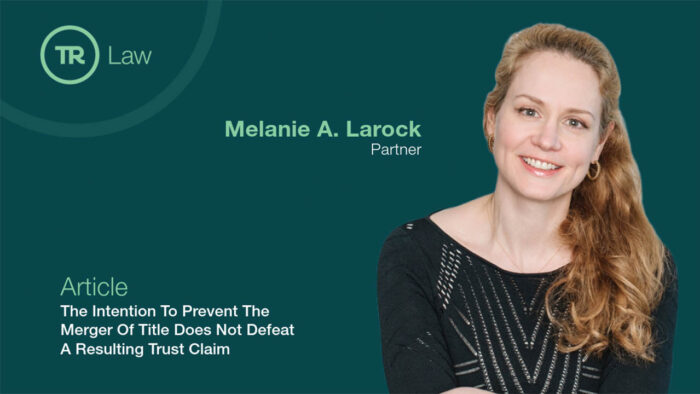CONFIDENTIAL CONSULTATIONS BETWEEN EXPERTS AND COUNSEL NOW PERMITTED
Author(s): Darcy R. Merkur
February 25, 2015
There is absolutely nothing improper with counsel’s practice of reviewing draft expert reports, according to the Ontario Court of Appeal in its hotly anticipated January 29th decision in Moore v. Getahun et al (2015) ONCA 55 (OCA).
In fact, the Ontario Court of Appeal in Moore went further to say that draft reports, including notes of consultations between experts and counsel, are now subject to a qualified litigation privilege – a privilege that can be disregarded by the Court only in extreme circumstances where the opposing lawyer establishes a factual foundation to allege improper influence.
The Ontario Court of Appeal in Moore validates the important role of a lawyer in assisting their expert. For example, the Court of Appeal highlights the crucial mediating role of counsel in explaining legal issues to the expert witness.
While Moore involved a medical malpractice claim, the decision has profound impacts on all areas of litigation.
In Moore, the plaintiff/appellant had developed compartment syndrome and claimed it was as a result of the negligent medical treatment he received on his fractured wrist following a motorcycle accident. As was then common practice, the defence medical expert had prepared a draft report and had sent it to his counsel for comments.
At trial, in reviewing the defence expert’s file, plaintiff’s counsel found the draft reports as well as the defence expert’s notes in relation to a one-and-a-half hour telephone conference between the defence expert and defence counsel regarding the draft report.
The trial judge, The Honourable Madam Justice Janet M. Wilson of the Ontario Superior Court of Justice, concluded that, while the expert’s opinion was not changed as a result of discussions with their counsel, it was certainly shaped by defence counsel’s suggestion.
Justice Wilson expressed concern with the common approach by counsel to review draft reports and stated that, in light of the new expert rules aimed at ensuring expert witness’ independence and integrity, “counsel’s prior practice of reviewing draft reports should stop.”
Justice Wilson commented that discussions between counsel and an expert to review and shape a draft expert report are no longer acceptable and that any input by counsel on a draft report should be disclosed in writing to opposing counsel.
Simply put, Justice Wilson’s decision, if allowed to stand, had the potential to completely overhaul the normal and common practice of counsel helping experts refi ne their opinions on matters in issue having regard to the appropriate legal considerations.
In Moore, the Ontario Court of Appeal entertained valued submissions from a host of advocacy organizations about the practice of reviewing draft expert reports and engaging in confi dential consultations with experts. The advocacy organizations agreed that the approach taken by Justice Wilson would represent a major change in practice and that consultation between experts and counsel was necessary, within certain limits, to ensure effi ciencies at trial and to ensure the affordable and just resolution of claims.
After considering the issues, the Ontario Court of Appeal, in a unanimous decision written by The Honourable Mr. Justice Robert Sharpe, makes three key comments about draft reports and consultations between counsel and experts that can be summarized as follows:
- Consultation and collaboration between counsel and an expert witness is proper;
- Draft reports and notes of consultations between experts and counsel are subject to a qualified litigation privilege;
- The qualified litigation privilege can be ignored by the Court if the opposing party can show reasonable grounds to suspect that counsel communicated with an expert witness in a manner likely to interfere with the expert witness’ duties of independence and objectivity.
In discussing circumstances where the qualified litigation privilege might be waived, the Court makes it clear that the bar will be high and that a factual foundation to support a reasonable suspicion would be required, noting that evidence of a lengthy call between counsel and an expert would not constitute the necessary factual foundation for allegations of improper influence.
As a result of the Moore decision, experts should review their fi les and parse out any existing draft reports and any existing notes and records of consultations with retaining counsel into a separate ‘litigation privilege’ subfolder.
In the end, the Ontario Court of Appeal rejects Justice Wilson’s approach of prohibiting counsel’s consultation with experts. The appeal though is lost on the basis that the errors made by the trial judge are determined to have not impacted the outcome.
The Court of Appeal’s decision in Moore provides crucial clarity over the role between experts and counsel. Interestingly, the Moore case was heard by the Ontario Court of Appeal at the same time as the appeal in Westherhof v. Gee, 2013 ONSC 2093 (Ont. Div. Crt.), a related case on expert issues dealing primarily with the role of treatment providers as experts in the context of the current Ontario expert report rules. The Westherhof decision should be released shortly and should provide even further guidance on the process of efficiently introducing useful expert evidence at trial.
Darcy Merkur is a partner at Thomson Rogers in Toronto practising plaintiff’s personal injury litigation, including plaintiff’s motor vehicle litigation. Darcy has been certified as a specialist in Civil Litigation by the Law Society of Upper Canada and is the creator of the Personal Injury Damages Calculator.
Share this








